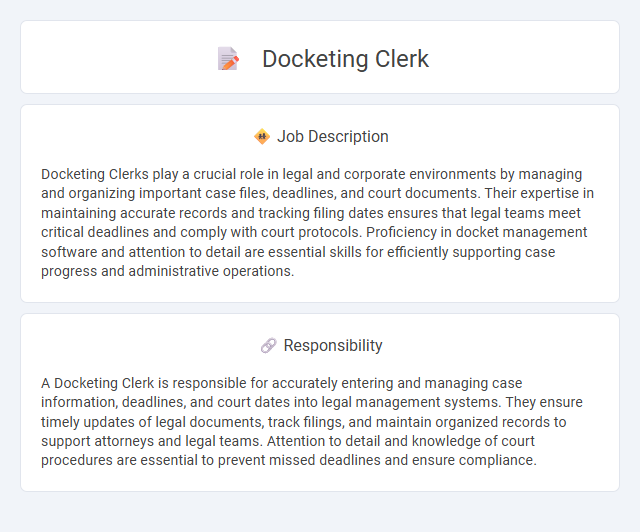
Docketing Clerks play a crucial role in legal and corporate environments by managing and organizing important case files, deadlines, and court documents. Their expertise in maintaining accurate records and tracking filing dates ensures that legal teams meet critical deadlines and comply with court protocols. Proficiency in docket management software and attention to detail are essential skills for efficiently supporting case progress and administrative operations.
Individuals with strong organizational skills and attention to detail are likely suitable for a Docketing Clerk position, as the role involves managing case files and legal documents accurately. Those who thrive in structured environments and can handle repetitive tasks without losing focus probably find this job fitting. Conversely, people who struggle with routine or have difficulty maintaining consistency might face challenges in this role.
Qualification
Docketing Clerks must possess strong organizational skills and attention to detail to accurately manage and track legal documents and case information. Proficiency in legal software, data entry, and understanding of legal terminology are essential qualifications for this role. A high school diploma or equivalent is typically required, while experience in legal environments and coursework in paralegal studies can enhance job prospects.
Responsibility
A Docketing Clerk is responsible for accurately entering and managing case information, deadlines, and court dates into legal management systems. They ensure timely updates of legal documents, track filings, and maintain organized records to support attorneys and legal teams. Attention to detail and knowledge of court procedures are essential to prevent missed deadlines and ensure compliance.
Benefit
Docketing clerks likely experience improved organizational skills due to consistent handling of legal documents and case schedules. They probably enjoy job stability given the essential nature of their role in legal and administrative settings. Opportunities for advancement in the legal field might increase as a result of their detailed knowledge of court proceedings and documentation.
Challenge
Docketing Clerk roles may present challenges related to managing a high volume of documents accurately within strict deadlines, increasing the probability of errors under pressure. Navigating complex legal terminology and varied case types often requires a strong attention to detail and continuous learning to maintain efficiency. Effective organizational skills are likely essential to reduce the chances of missed filings and ensure timely court submissions.
Career Advancement
Docketing Clerks play a crucial role in legal and administrative settings by managing case files and tracking document deadlines, which builds foundational knowledge of procedural workflows and case management systems. Mastery of docketing software and attention to detail can lead to career advancement opportunities such as Legal Assistant, Paralegal, or Administrative Manager positions within law firms or corporate legal departments. Developing expertise in compliance and regulatory requirements further enhances prospects for promotion into supervisory or specialized roles in records management or litigation support.
 kuljobs.com
kuljobs.com